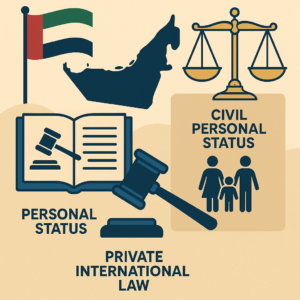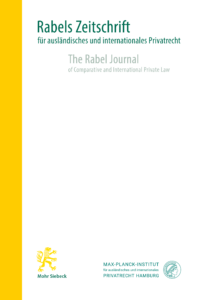Views
The Personal Status Regimes in the UAE — What’s New and What Are the Implications for Private International Law? A Brief Critical Appraisal
 Prologue
Prologue
On 15 April 2025, the new federal UAE law on personal status (Federal Decree Law No 41 of 14 October 2024) officially entered into force ( “2024 PSL”). This law fully replaces the 2005 Federal Act on Personal Status (Federal Law No. 28 of 19 November 2005 as subsequently amended) (“2005 PSL”). The new law marks the latest step in the UAE remarkable wave of legal reforms, particularly regarding personal status matters. It follows a series of significant developments at both the federal and local levels. At the federal level, this includes the adoption of the law on Civil Personal Status (Federal Decree-Law No. 41 of 3 October 2022 on Civil Personal Status) (“2022 CPSL”) and its executive regulation. At the local level, specific legislations were adopted in the Emirate of Abu Dhabi, most notably the 2021 Law on Civil Marriages and its Effects (as subsequently amended) (“2021 ADCML”), and its Procedural Regulation. These legislative efforts collectively address what is commonly referred to as “civil family law” (for further details see previous posts on this blog here, here, here, and here). Together with the new 2024 PSL, these instruments will collectively be referred to as the “Family Law Regulations” (see Table below). Read more
Opinion of AG de la Tour in C-713/23, Trojan: A step forward in the cross-border recognition of same-sex marriages in the EU?
Dr. Carlos Santaló Goris, Postdoctoral researcher at the University of Luxembourg, offers an analysis of the Opinion of Advocate General de la Tour in CJEU, Case C-713/23, Trojan
From Coman to Trojan
On 5 June 2018, the Court of Justice of the European Union (‘CJEU’) rendered its judgment in the case C-673/16, Coman. In this landmark ruling, the CJEU decided that Member States are required to recognize same-sex marriage contracted in another Member Stated to grant a residence permit to the non-EU citizen spouse of an EU citizen under the EU Citizens’ Rights Directive. The pending case C-713/23, Trojan goes a step further than C-673/16, Coman. On this occasion, the CJEU was asked whether EU law requires a civil registry of Poland, a Member State that does not provide any form of recognition to same-sex couples, to transcribe the certificate of same-sex marriage validly contracted in another Member State. A positive answer would imply that the same-sex marriage established under German law would be able to deploy the same effects as a validly contracted marriage under Polish law. While the CJEU has not yet rendered a judgment, on 3 April 2025, Advocate General de la Tour issued his Opinion on the case. While the CJEU might decide differently from AG de la Tour, the Opinion already gives an idea of the solution that might potentially be reached by the CJEU. This post aims to analyse the case and explore its implications should the CJEU side with AG de la Tour. Read more
A New Precedent in Contract Conflicts: Decoding the Tyson v. GIC Ruling on Hierarchy Clauses
By Ryan Joseph, final-year BBA LLB (Hons) student, Jindal Global Law School, India.
Introduction
The recent decision of the UK High Court (“Court”) in Tyson International Company Limited (“Tyson”) v. General Insurance Corporation of India (“GIC”) sets a critical precedent for cases that lie at the intersection of arbitration, contractual hierarchy, and judicial intervention through anti-suit injunctions. The principal issue in the case revolved around the harmonious application of two conflicting dispute resolution clauses contained in two separate agreements pertaining to the same transaction. While one provided for dispute settlement through arbitration seated in New York, the other was an exclusive jurisdiction clause that provided for dispute settlement by England and Wales courts. To resolve this apparent conflict between the two clauses, the Court relied on a confusion clause (also known as a hierarchy clause) in the parties’ agreement to rule that the exclusive jurisdiction clause, in favour of England and Wales courts, prevails over the arbitration clause. Based on this conclusion, the Court issued an anti-suit injunction against GIC from arbitrating the dispute in New York. Read more
News
RabelsZ 89 (2025): Issue 3
The latest issue of RabelsZ has just been released. It contains the contributions to the symposium in honor of Jürgen Basedow that was held in Hamburg in November 2024. The table of contents is available here. All content is Open Access: CC BY 4.0 and more articles are available Online First.

Eva-Maria Kieninger, Konrad Duden and Ralf Michaels, Preface to the Symposium Issue, pp. 409–410, https://doi.org/10.1628/rabelsZ-2025-0046
Hannah L. Buxbaum, The New Unilateralism in EU Cross-Border Regulation: Objectives, Methods, Institution, oo. 411–431, https://doi.org/10.1628/rabelsZ-2025-0043
For years, Europe was a site of resistance to regulatory unilateralism, particularly as practiced by the United States. Today, though, there are signs of a robust unilateralism at work in EU regulatory practices. To some extent it simply mirrors practices adopted in the United States and elsewhere: Like other lawmakers, the EU has begun to act unilaterally where necessary to achieve effective regulation of its own markets and to protect local interests. In other respects, though, the new unilateralism in the EU presents quite differently. First, the EU increasingly uses its own legislation not to advance purely local regulatory interests, but rather to achieve international or global goals – classically a more multilateral objective. Second, under EU law individual regulations in particular substantive areas are embedded in a larger framework of norms and values that claim universal appeal. In both of these regards, the EU version of unilateralism appears more benign than purely »self-interested« unilateralism. It nevertheless raises important questions about the way that local laws and institutions are used to project regulatory power in the international arena. The goal of this article is to explore these questions. It begins by describing the characteristics of this new unilateralism, in terms of both its doctrinal foundations and its regulatory objectives. It then focuses on one particular mechanism: the adequacy regime established under EU data protection law.
Launch of the Bahrain International Commercial Court
The Bahrain International Commercial Court (BICC) was launched on 5 November 2025. It joins the long established Dubai International Financial Centre Courts, Abu Dhabi Global Market Courts and Qatar International Court and Dispute Resolution Centre in the Middle East as a specialist court devoted to resolving international commercial disputes and operating under special procedural rules.
The BICC was developed in partnership with the Singapore International Commercial Court (SICC). It shares many key features with the SICC such as a multinational bench, foreign counsel representation and use of the English language in proceedings. Of particular note is the appeal mechanism for BICC judgments; as discussed previously here, appeals from the BICC will be heard by the International Committee of the SICC.
ASADIP Conference Rio 2025 (report) and San Salvador 2026 date (20-23 October)
 The ASADIP conference is an annual highlight of the discipline. The reports from the 2025 conference in Rio de Janeiro are now available, in English, Spanish, and Portuguese, here
The ASADIP conference is an annual highlight of the discipline. The reports from the 2025 conference in Rio de Janeiro are now available, in English, Spanish, and Portuguese, here
And the location and date for the 2026 have been set for San Salvador, El Salvador, 20-23 October. See you there.


